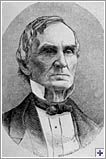The Confederate States of America continues organizing its government and making military preparations in anticipation of a possible military response from the United States. Meanwhile, southern white Christian ministers – Baptists included – provide ongoing theological cover for the institution of black slavery that the Confederacy is devoted to defending.
Adiel Sherwood (1791-1879), longtime and renowned Georgia Baptist minister and religious educator (link), tackles the subject of religious liberty as it relates to black slavery:
I cannot see sin in the institution itself, if the slaves are properly treated …. Show that the Bible condemns or censures the relation of master and slave, and my tongue is silent; but I am not to be driven from my position, impregnable as the everlasting hills, by fashion, fanaticism or ridicule ….
…. the slaves enjoy soul liberty, a much higher privilege than mere bodily freedom …. If I must have an enslaved body or mental vassalage, and a fettered conscience, give me the former, for it will soon to cease …. thousands [of slaves] belong to the various religious persuasions and are traveling to the promised land, better off than the free in many lands …. I regard abolitionists as the 2nd or 3rd edition of the Salem Witchcraft.”
Source: “Religious Liberty and Slavery,” Christian Index, February 20, 1861, p. 1
For further reading:
Jarrett Burch, Adiel Sherwood: Baptist Antebellum Pioneer in Georgia (Macon, Ga.: Mercer University Press, 2003).
Jarrett Burch, “Adiel Sherwood: Religious Pioneer of Nineteenth-Century Georgia,” Georgia Historical Quarterly 87 (spring 2003): 22-47.
Daniel P. Sanders, “Frontier to Forefront: Adiel Sherwood and the Shaping of Georgia Baptists, 1818–1841,” Viewpoints: Georgia Baptist History 12 (1990).
Julia L. Sherwood, Memoir of Adiel Sherwood, D.D. (Philadelphia: Grant and Faires, 1884).



